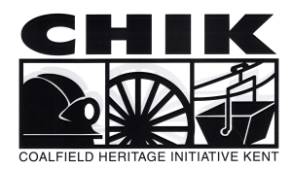Arthur Burr and the Development of the Kent Coalfield

Arthur Burr was a speculator who virtually single-handededly kept the Kent coalfield going for almost twenty years, despite the constant threat of economic collapse.
Burr formed the first Kent coal company in 1896 to build the colliery at Shakespeare Cliff. The Colliery was supposed to cost £50,000, with the aim that it would be producing 3,000 tons of coal per day by 1900. In the twenty-two years in which Shakespeare Colliery was operating, it cost more than £1 million and never produced any commercial coal.

Arthur Burr
In 1913 Burr was given the Freedom of Dover for being "one of the greatest benefactors Dover had ever known" and at the dinner famous writer Sir Arthur Conan Doyle, as guest speaker, sang his praises. Conan Doyle promised that Dover would become the 'Liverpool of the South' and soon would be one of the six biggest cities in Britain.
Burr was still convinced that Kent coal would make both he and his investors rich, but had not counted on flooding, nor had he realised the coal was so far down. To Burr's dismay, the seams were thin and folded and the coal itself was of extremely poor quality. Nevertheless, between 1904 and 1910 Burr established five more collieries. Each time Burr ran into the same problems. None of his collieries managed to produce coal for commercial sale until 1912.

The Northbourne Boring 1913
Burr paid for borings all over east Kent to help him find the best locations for new collieries. In the 1920's Northbourne boring results would be used to locate Betteshanger Colliery.
Burr was suffering under the strain of keeping the press and shareholders happy, despite not making any income for almost two decades. He wanted to ensure shareholders and the general public believed there was money to be made in Kent coal. As a result, Burr began a complex and highly suspect system of forming new companies to undertake just small elements of the process of getting coal.
One company would own the mineral rights to a colliery, another would sink the shafts, another build the surface buildings and so on. This meant that, for example, if one of his companies could charge for digging a shaft, the bill would be paid by another of his companies. Essentially Burr had become his own customer in order to ensure money moved around and consequently profits could be shown. By 1910, Burr was Manager or Director of twenty-two different companies, all of which had his Kent Coal Concessions Ltd as a major shareholder.
Investors began to realise than any profits generated by the coalfield would be tiny when split between all the shares flying around. Burr was accused by some of being a conman. In 1914 he was forced to resign from all his posts and faced several legal actions for fraud and misuse of funds. Described as "a dangerous rogue" by the Judge, he had judgements of £80,000 made against him and was declared bankrupt.
He died in 1919 with many legal actions against him still outstanding.

Oxney Boring Crew 1912
This crew was from Belgium. Coal was discovered in the Pas de Calais region in 1846 and it was often quicker and cheaper get experienced boring teams from France or Belgium than from other British coalfields.

Building Tilmanstone Colliery 1907
Burr was always short of capital and always close to bankruptcy. With no money, all equipment and machinery at Snowdown and Tilmanstone was purchased second hand. Sometimes work even had to stop for weeks or months until he found more money.

Raising of the first Kent coal, Snowdown
19 November 1912 After sixteen years trying, Kent coal was raised at Snowdown Colliery in 1912. As news spread, hundreds of people rushed from Dover to see. Burr is in the centre.